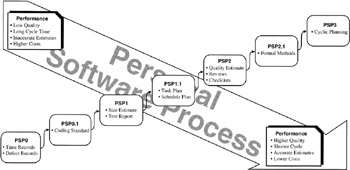3.2 Personal Software ProcessSM
3.2 Personal Software Process SM
The Personal Software Process SM is a training curriculum. It is designed to teach software engineers basic principles in software project and quality management. A goal of the Personal Software Process SM is to change the behavior of software engineers and teach them to measure their work. It also teaches them to analyze their measures and achieve performance goals. They often have a chance to see the benefits of software project and quality management. This is accomplished by teaching software engineers how to apply basic principles of SPI. They also learn how to make accurate plans and improve product quality, as well as measure and improve their performance using SPI principles. The Personal Software Process SM consists of basic techniques such as time and defect recording. It also includes statistical size , cost, and quality estimating, testing, and earned value management. Checklists and reviews, formal methods , and cyclical life cycle development are included as well. Figure 2 illustrates the Personal Software Process SM .

Figure 2: Personal Software Process SM Levels
The Personal Software Process SM consists of four major steps or plateaus. The steps are personal measurement (PSP SM 0), personal planning (PSP SM 1), personal quality (PSP SM 2), and cyclic process (PSP SM 3). The first three steps also contain incremental steps or minor variations, namely PSP SM 0.1, PSP SM 1.1, and PSP SM 2.1. The steps represent simple software life cycles consisting of increasingly complex methods in project and quality management. The training requires software engineers to develop a series of mathematical computer programs using each of the steps. The steps are also known as seven software life cycles. By doing so, software engineers gain firsthand experience with increasing benefits. These consist of increasing precision and quality associated with using basic software project and quality management techniques.
The Personal Software Process SM has as its underlying foundation the notion that numerous benefits are possible. Software engineers are asked to combine earned value management and software quality management. They must find twice as many defects before testing as during testing using individual reviews.
The benefits include improved software estimation accuracy and greater software project precision and predictability. Shorter and more accurate software schedules, higher productivity, and faster cycle times often result. High levels of software quality and reliability, and zero software failures in fielding, use, and operation are common results. All benefits combined lead to substantially lower costs.
EAN: 2147483647
Pages: 145